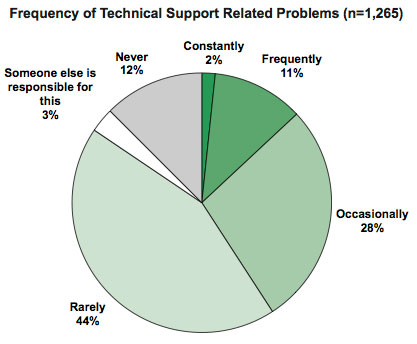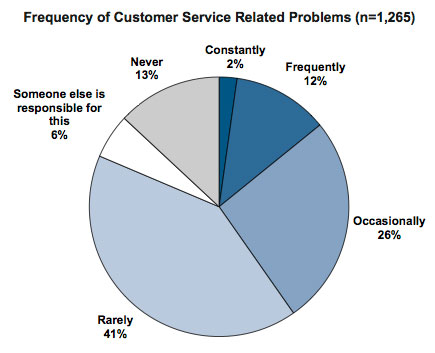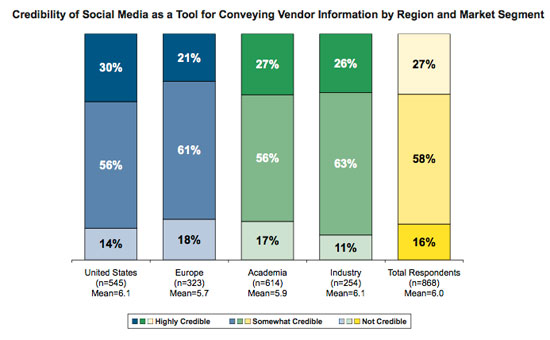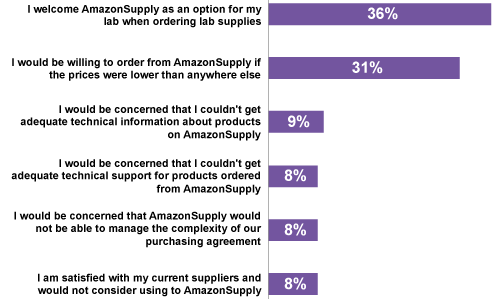Lab Attitudes
A collection of interesting life science industry facts and figures from the past few weeks.
“What a time to be alive!” From sheer overuse, I’m eliminating this declaration from my phraseology. I can’t help but use it. I live in 2012, after all, when every other science-related news story expounds some new and wonderful use for stem cells, or some genome sequencing breakthrough, or some new exciting (and/or depressing) study in epigenetics. Scientists are manipulating cockroaches and worms via remote control, they’re blocking out our fears and creating false memories, all while curing mice of this and that.
For now though, let me introduce a new segment of Lens on the Life Science Industry: Lab Attitudes. Every month or so we’ll be posting interesting tidbits from our findings—we are a market research company after all, it’s what we do!—that may or may not be related to one another. Think of it as a miscellaneous collection of insights we get from asking scientists questions, a repository for ongoing research, a taking of vital signs for life science labs. Or think of it as just another reason right now is a great time to be alive.
To the numbers!
1. How often do scientists experience customer service and tech support issues?
We asked 1,099 scientists from North America and Europe who have had a customer service and/or technical support related problem in the last 6 months: How often have customers experienced a customer service and technical support related issue in the last six months?
Although the reasons why one might contact customer service and technical support might vary, the frequency with which researchers have customer service or technical support related problems is similar.
Approximately one-quarter of respondents indicate that they have had service/support related problems occasionally (i.e., once a month) in the last six months. A much lower percent of respondents indicate that they have had service/support related problems more often than Frequency of Customer Service Related Problems (n=1,265) once a month in the last six months (i.e., frequently or constantly). Some respondents indicate that they have not had a customer service or technical support related problem in the last six months or someone else in their lab is responsible for handling these problems. Respondents who indicate they have not experienced, or they don’t handle, both service and support related problems in the last six months did not participate in the remainder of this study (p. 2-1 provides a more detailed explanation of the survey requirements).
Customer Service and Technical Support were defined in this study the following ways:
Customer Service: assistance provided after a purchase decision has been made related to order fulfillment, delivery and billing of products (e.g., a non-technical problem).
Technical Support: advice and assistance provided related to the use and performance of a product/instrument and identifying the correct product for a particular application/experiment based on your technical needs.

From Customer Service and Technical Support for Life Science Products: Customer Preferences, © BioInformatics LLC.
2. Do scientists believe what vendors “say” on social media sites?
In general, respondents believe that social media is a credible tool for vendors to use to convey information (27% highly credible, 58% somewhat credible). However, this belief is by no means absolute and is likely to be tinged with some degree of skepticism. Nevertheless, only a small percent of respondents overall (16%) felt that social media was not a believable communication medium for vendors. While there was less divergence of opinion by market segment, there was more divergence by geographic region. A slightly greater percent of United States (US) respondents as compared to European respondents indicated they consider social media to be a highly credible communication channel.
Younger scientists are more inclined to view social media as a trustworthy conduit of information than are older scientists. As an emerging marketing tool, vendors will need to be cautious not to overstep scientists’ boundaries when it comes to reaching out to them via different social media channels. There appears to be very strong preferences for what channels are considered appropriate for personal versus professional use.
“I only use social networking through Facebook and do not want to do business there! It is for my family and friends only.” – Anne, Lab Manager/Director, Academia
Note: Credibility is measured on a 10-point scale where 10=extremely credible and 1=not at all credible. For the presentation of results the following responses were grouped: highly credible=8 to 10, somewhat credible=4 to 7 and not credible=1 to 3.
These findings have been taken from eMarketing to Life Scientists: Raise Your Voice Above the Noise © BioInformatics LLC. Please contact us for details on how to purchase the report.
3. Scientists’ attitudes toward AmazonSupply
Amazon has opened a new online store called AmazonSupply. AmazonSupply offers some basic laboratory equipment and supplies such as labware, balances and centrifuges.
Which of the following describes your willingness to purchase from AmazonSupply?
As you can see, two-thirds chose either “I welcome AmazonSupply as an option for my lab when ordering supplies” (36%) or “I would be willing to order from AmazonSupply if the prices were lower than anywhere else” (31%), indicating a majority willingness to accept the new distributor in their lab procurement diet.
The skeptics were divided among “I would be concerned that I wouldn’t get adequate technical information about products on AmazonSupply” (9%), “I would be concerned that I couldn’t get adequate technical support for products ordered from AmazonSupply” (8%), and “I would be concerned that AmazonSupply would not be able to manage the complexity of our purchasing agreement” (8%).
Still another 8% reported that they are “satisfied with (their) current suppliers and would not consider using AmazonSupply.”








